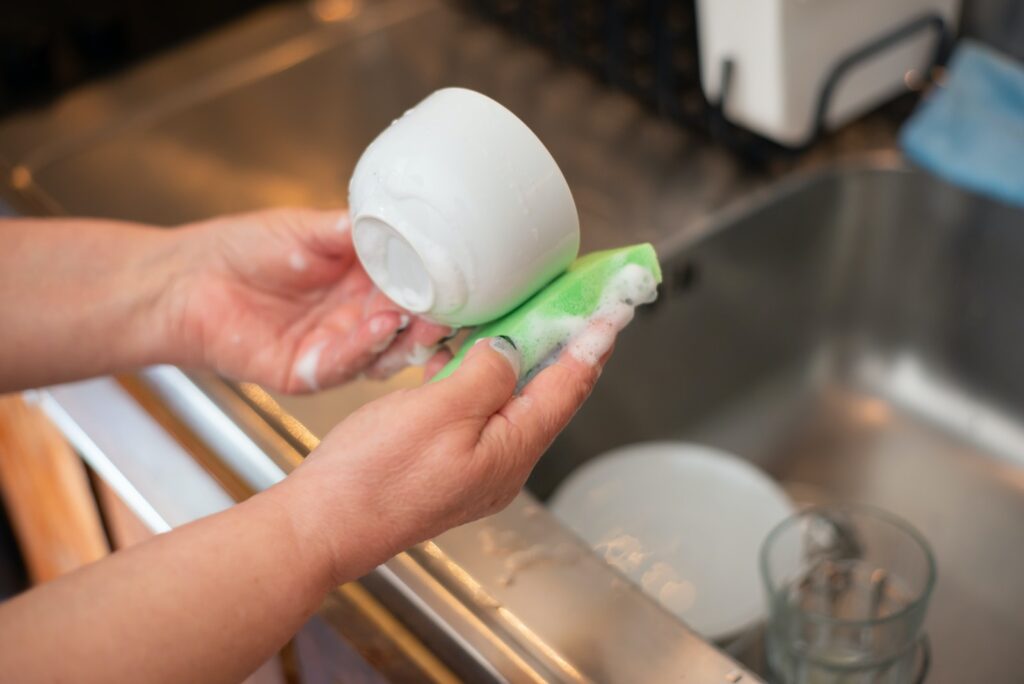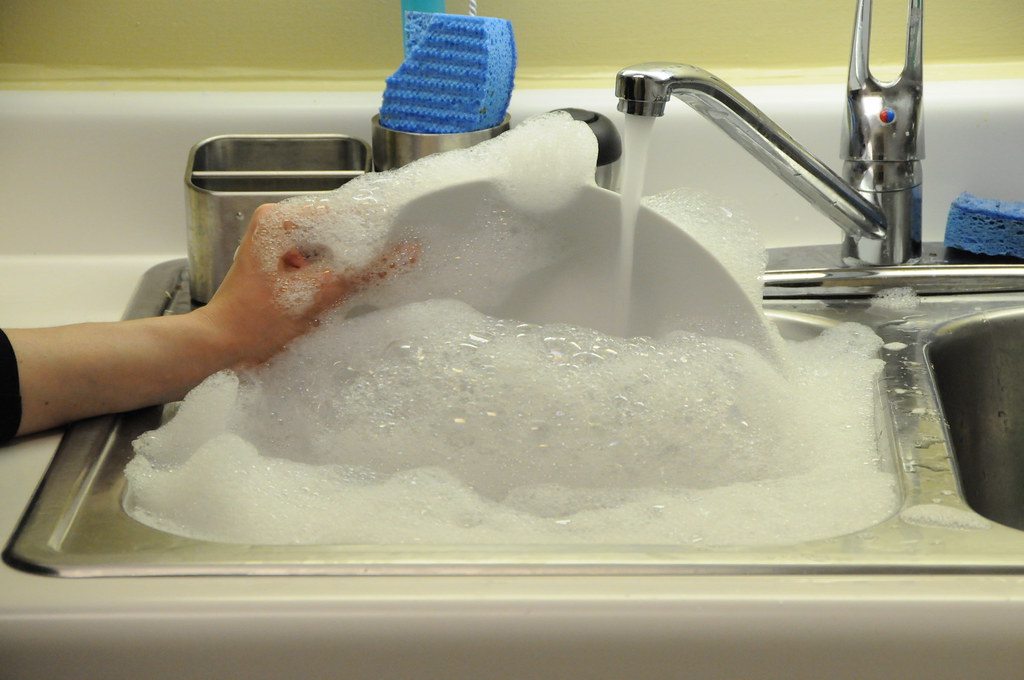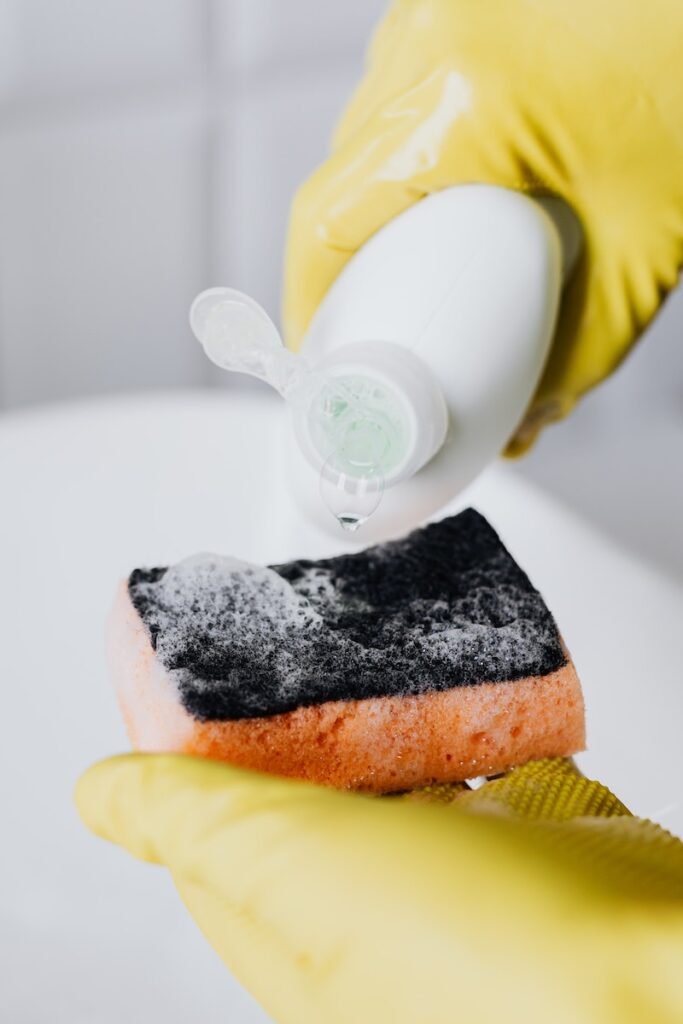An Ultimate Guide on How to Make Dish Soap. Dish soap, also known as dishwashing liquid or detergent, has numerous practical uses beyond just washing dishes. It’s a versatile cleaning product that can be utilized in various ways around your home. You can make your own dish soap at home using simple and eco-friendly ingredients. Here’s a basic recipe on how to make dish soap:
Ingredients:
- 1 cup of liquid castile soap (unscented or scented, depending on your preference)
- 1/4 cup of water
- 1 tablespoon of white vinegar
- 1 teaspoon of baking soda
- A few drops of essential oils for fragrance (optional)
- A reusable soap dispenser or an empty dish soap container

Instructions on How to Make Dish Soap:
- Start by finding a clean, empty container to store your homemade dish soap. A reusable soap dispenser or an empty dish soap container works well.
- In a mixing bowl, combine the liquid castile soap and water. Mix them together thoroughly.
- Add the white vinegar to the soap and water mixture. Vinegar helps cut through grease and adds extra cleaning power.
- Slowly sprinkle the baking soda into the mixture, stirring continuously. Be prepared for some fizzing and bubbling, but don’t worry; this is normal and will settle down.
- If you want to add a pleasant fragrance to your dish soap, you can incorporate a few drops of essential oils. Some popular choices include lemon, lavender, or tea tree oil. Adjust the number of drops based on your scent preference.
- Once everything is well-mixed, carefully pour the homemade dish soap into your chosen container. Make sure to leave some space at the top for shaking before each use.
- Seal the container and label it with the contents for easy identification.
To use your homemade dish soap, simply shake the container before each use and dispense the desired amount onto your dish sponge or scrub brush. This DIY dish soap is generally gentle on your hands and the environment, making it a great alternative to commercial dish soaps that may contain harsh chemicals.

Mechanism of Dish Soap In Cleaning Dishes:
Dish soap effectively cleans dishes through a combination of physical and chemical mechanisms. When you apply dish soap to dirty dishes, it works to break down and remove food particles, grease, and grime.
The soap’s primary cleaning agent, often a surfactant, acts as an emulsifier. It lowers the surface tension of water, allowing it to penetrate and surround greasy or oily substances on the dishes. This action loosens the bonds between these substances and the dish’s surface.
Simultaneously, the soap molecules contain a hydrophilic (water-attracting) end and a hydrophobic (water-repelling) end. The hydrophilic end binds with the water, while the hydrophobic end attaches itself to the oils and fats on the dishes. This creates tiny micelles—small clusters of soap molecules that trap the oils, grease, and food particles.
As you scrub or agitate the dish with a sponge or brush, the tra particles are lift off the dish’s surface and suspend in the soapy water. Rinsing the dish with clean water then washes away the micelles and the particles they contain, leaving the dishes clean and free from residues.
In summary, dish soap cleans dishes by reducing the surface tension of water, breaking down oils and grease, and allowing them to be lifted away from the dishes’ surfaces. The soap’s unique molecular structure and the action of scrubbing work in synergy to achieve effective and thorough cleaning.
Benefits of Using Dish Soap:
Using dish soap offers several benefits, making it an essential household cleaning product. Here are some of the key advantages of using dish soap:
- Effective Cleaning: Dish soap is specially formulate to cut through grease and food residues, making it highly effective at cleaning dishes and cookware. It removes grime, stains, and baked-on food, leaving your dishes clean and sanitized.
- Versatility: Dish soap is a versatile cleaner that can be use for various household cleaning tasks beyond dishes. It can clean countertops, appliances, windows, floors, and even serve as a hand soap substitute in a pinch.
- Gentle on Hands: Many dish soaps are design to be gentle on your hands, even with frequent use. They often contain moisturizing ingredients to prevent dryness and irritation.
- Cost-Effective: Dish soap is an affordable cleaning solution that goes a long way. A small amount of soap can produce a significant amount of cleaning power, making it a cost-effective choice.
- Eco-Friendly Options: There are environmentally friendly and biodegradable dish soaps available that are safe for the environment. These options typically contain fewer harsh chemicals and are safer for aquatic life.
- Removes Foodborne Pathogens: Properly used dish soap helps eliminate foodborne pathogens from your dishes, reducing the risk of foodborne illnesses.
- Stain Removal: Dish soap can be use to remove stains from clothing and other fabric items. It’s particularly effective on grease and oil stains.
- Pest Control: A diluted solution of dish soap and water can be use as a pest control spray in the garden to deter insects and garden pests like aphids.
- Degreaser: Dish soap is an excellent degreaser for cleaning kitchen appliances and surfaces. It can help remove stubborn grease and grime from stovetops, ovens, and range hoods.
- Lubricant: In a pinch, dish soap can be used as a temporary lubricant for tasks such as unsticking a zipper or squeaky door hinge.
- Health and Hygiene: Using dish soap for washing hands when other hand soaps are unavailable can help maintain personal hygiene and reduce the risk of illness.
- Scent Options: Dish soaps come in a wide variety of scents, allowing you to choose a fragrance that suits your preferences and makes dishwashing a more pleasant task.
Overall, dish soap is a valuable cleaning product that offers effective cleaning, versatility, and convenience. It’s a staple in most households, helping to maintain cleanliness and hygiene in the kitchen and beyond.

Other Uses of Dish Soap:
Dish soap, also known as dishwashing liquid or detergent, has numerous practical uses beyond just washing dishes. It’s a versatile cleaning product that can be utilized in various ways around your home. Here are some common uses of this soap:
- Dishwashing: Of course, the primary use of dish soap is for washing dishes. It helps to cut through grease, remove food residues, and make your dishes clean and sparkling.
- Hand Soap Replacement: When you run out of hand soap, dish soap can serve as a substitute for washing your hands, although it may be a bit harsher on the skin, so use it sparingly.
- Fruit and Vegetable Wash: Use a diluted solution of dish soap and water to wash fruits and vegetables to remove pesticides, wax, and contaminants. Be sure to rinse thoroughly with water after washing.
- Stain Remover: Apply a small amount of dish soap directly to fresh clothing stains, such as oil, grease, or makeup stains. Gently rub the fabric together, then launder as usual.
- Car Wash: Dish soap can be used to wash your car. It effectively removes dirt and grime from the vehicle’s exterior. Mix it with water in a bucket and use a sponge or cloth.
- Cleaning Appliances: Dish soap can be used to clean various household appliances, such as stovetops, ovens, and microwaves. It helps to cut through grease and food splatters.
- Window and Glass Cleaner: A diluted solution of dish soap and water is effective for cleaning windows, glass surfaces, and mirrors. Make sure to rinse and wipe thoroughly for streak-free results.
- Floor Cleaner: Add a small amount of dish soap to a bucket of water for mopping hard floors. It helps to remove dirt and grime effectively.
- Pet Flea Shampoo: In a pinch, dish soap can be use to wash your pet to help get rid of fleas. However, consult with a veterinarian for safe and appropriate flea treatment for your pet.
- Jewelry Cleaner: Soak your jewelry in a mixture of warm water and dish soap to remove built-up grime and restore shine.
- Grease Stain Remover: Dish soap can help remove grease stains from clothing, upholstery, or carpets. Apply it to the stain, let it sit for a few minutes, then blot or rinse with water.
- Gardening Pest Control: A diluted dish soap solution can be use to deter or eliminate garden pests like aphids or mealybugs from plants.
- Grill Cleaner: It can be used to clean and degrease your barbecue grill grates.
Remember that dish soap comes in various formulations, so be sure to choose an appropriate type for each specific use. Additionally, use it sparingly, as excessive use can sometimes leave residue or require more water for rinsing.